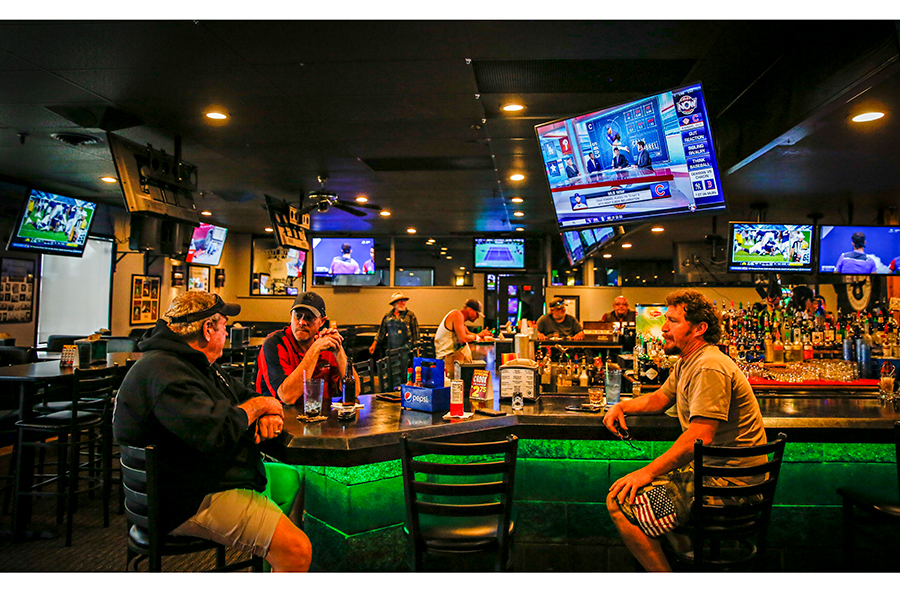After a tumultuous start due in part to the COVID-19 pandemic in 2020, the emergent Montana sports betting market picked up in 2021, with Montana bettors wagering $46 million through December 27.
The return of sports and the reopening of bars heading into 2021 meant the state could finally see how its product, Sports Bet Montana, would fare in a post-COVID lockdown world. And so far, it’s been a mixed bag: the amount bet in 2021 increased by $28 million compared to 2020, but the state is still offering substandard odds to its bettors.
Regardless of the odds, though, with more than $2 million wagered every month in 2021, it is clear Montanans have some level of appetite for sports betting. In total, through December 27, $46 million was wagered, and $40 million was paid out by the state in 2021, compared to $18 million wagered and $16 million paid out in 2020, according to Montana Lottery data.
“We launched in March of 2020 … we couldn’t have picked a worse time to launch a technology sports product in human history,” said communications manager Jennifer McKee earlier this month before she left the Montana Lottery. “In 2021, we started seeing the kinds of betting behavior that we were hoping to see. We had games to bet on, and we had the sports that Montanans really cared about.”
The most popular sports to bet on in 2021 followed the seasons of the country’s three dominant sports leagues: NFL, NBA and MLB. January through April, basketball was the most bet on sport; May through August was baseball; and September through December was football. And for Griz and Bobcat football, bettors seemed more confident in the Bobcats, betting $420,000 on the Bozeman team compared to $303,000 on the Griz, according to data from the Montana Lottery.
Between its debut in March of 2020 and January 3, the state has raked around $9 million of revenue. But it’s not just the state that is profiting. Because of the legislative framework of the bill that legalized sports betting in Montana, to place a bet, a sports bettor has to be near a sports betting kiosk. The kiosks are most commonly located in bars and casinos, which receive 6 percent of all bets placed — leaving them with $2.7 million of profit from sports betting in 2021.
And while McKee said 2021 was smooth sailing, the rollout of sports betting in Montana was rough for reasons beyond just COVID-19.
In 2019, former Gov. Steve Bullock, a Democrat, vetoed a Republican sponsored sports betting bill that would have created more competition by allowing taverns and bars to offer their own sports betting options. Instead, he signed the Democrat-backed House Bill 725 into law, which gave control of sports betting to the state lottery.
And due to the bill’s monopolistic structure, Montana gamblers can only use Sports Bet Montana, which is run by third-party contractor Intralot, to place bets. Intralot has been the state’s long-time lottery vendor and received the sports-betting contract from the Montana Lottery in a controversial no-bid process.
Montana is one of the few places in the U.S. to use Intralot for sports betting, and in both Washington, D.C., and Montana, the company has been criticized for offering a lackluster product to its customers. Chief among the complaints are the poor odds provided to bettors. Instead of offering the industry-standard odds of -110, Sports Bet Montana often offers odds of -125 or -118 — meaning a bettor must wager $125 or $118 to win $100.
“I think the issues Montana has seen are not all dissimilar to other markets like Washington, D.C., where prices being offered are not competitive with offshore books or bookies who operate privately, which is going to limit the amount of revenue the state can bring in,” said Adam Candee, managing editor of Legal Sports Report.
With less than $10 million in revenue in two years, Candee said Montana is lagging behind what other states have seen after introducing sports betting. In just three months, Wyoming, which has an open market for sports betting, reported a handle, or amount of money wagered, of $28 million and revenue of $3 million, according to Wyoming state data.
“I think what we see in general as a national trend is states with an open market tend to see a higher betting handle and more betting revenue, which leads to more tax proceeds for the state,” Candee said.
And with a poor product, Candee said it is hard to draw bettors away from offshore betting sites or bookies. “The legal market has to make it enticing for those using the illegal market to come and use their product, and no one has been worse at doing that than Intralot,” Candee said.
However, McKee said that with more mouths to feed the profits from sports betting, Sports Bet Montana could not survive if it offered the same odds as Las Vegas.
“The law that’s behind Sports Bet Montana intended for the money to go three ways. Almost all of it goes back out to the bettor, of course, that’s true of any sportsbook. And then it goes to the state … but we split our share with the local bar,” she said. “So that’s one of the reasons that you see the Sports Bet Montana lines being different. Because in order for the local bar to get a significant piece of the pie, we had to cut the pie three ways instead of two. It’s not just the house and the bettor.”
This story originally appeared in the The Daily Montanan, which can be found online at dailymontanan.com.
